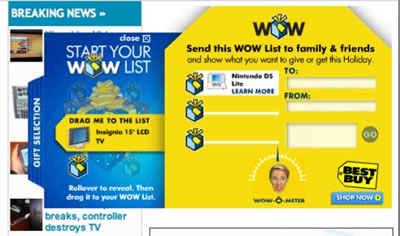 We spent a fair bit of time watching online advertising, as the income for Digital-Lifestyles comes in solely from it.
We spent a fair bit of time watching online advertising, as the income for Digital-Lifestyles comes in solely from it.
While we were researching the story about Engadget’s Dafur Gears of Peace auction, we noticed an advert on the right of the page by Best Buy, a major US electronics retailer.
It’s a format called MPU, which has, over the last year or so, become a favorite with adversities and publishers. The reason Message Plus Unit (MPU) is popular is its small size (250 x 250) lets it be placed within articles, heightening the hope that the reader of the site will pay some attention to the advert.
What Best Buy have done with the limited 250 x 250 size is the interesting part. We’re not focusing on the design, although it must be effective, or we wouldn’t have paid attention to it in the first place.

The reader is encouraged to place their mouse over the MPU. When it’s kept still there for 2-3 seconds, the graphic changes completely, expanding an additional 200 pixels to the left-hand side.
This is where it gets smart. The reader is able to select items from a list of six (you know the sort of thing, Nintendo DS Lite, LCD TV, etc) and drag and drop them to a dream xmas list.
Once the oh-I-really-want-one-of-those items has been selected, there’s a field to the email address of the person that is going to be mugged into buying them. Who it’s from and a suitable begging note can also be entered.
We love the theory of this – getting people to directly interact with an advert without having to go to another site and then spreading it to others too. The reality is that we couldn’t get the process to complete. Selecting items was easy enough, but we found the ad reset itself a number of times, losing all of the details in the meantime. If we hadn’t been looking at it for this article, we certainly wouldn’t have bothered re-entering the details.
It would be really interesting to find out how Engadget are being reimbursed for this. It must be above the standard rate of an MPU, the fact that it’s active will boost this alone. We suspect that Engadget must have sorted out a better deal, that will probably be related to the reader making an action, or even on the potential value of the purchases that might fall out of the end of this.